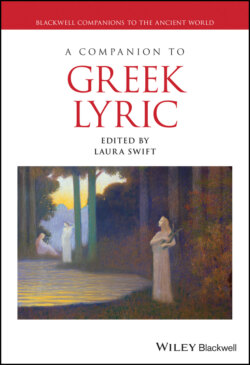Читать книгу A Companion to Greek Lyric - Группа авторов - Страница 22
Simonides’ Elegy for Plataia
ОглавлениеPoets were generally obliged to make a bow to the gods at the beginning of their compositions.50 Thus we have near-complete hymns and prayers at the beginning of a number of melic works. Pindar Ol. 4 is a good example, which gets under way with a magnificent prayer to Zeus. Elegy, too, was often launched by a show of piety, as the Theognidea 51 shows us; here a miniature hymn to Apollo and Artemis stands at the beginning of the work.52 Of particular interest, then, is the newly (partly) reassembled beginning of a long elegaic poem by Simonides on the Battle of Plataea, one of the two major Greek victories of the Persian Wars.53 The poem itself celebrates the heroism of the Spartans marching out from the Peloponnese, over the Isthmus, in pursuit of the Persians to save Greece from the “day of slavery” (25). The poet says they drew strength and courage from their epic forebears, in particular Menelaus (36), and from the twin Spartan “horsemaster sons” of Zeus, the Dioskoroi. At the Isthmus they sacrificed the diabateria, transition sacrifices, as we can extrapolate from the Greek [θεῶν τεράε]σ̣σι πεποιθότε̣ς, “trusting the divine signs” (39). But what interests us here particularly is the beginning of the poem, a hymnic encomium of Achilles, it seems, called the “son of the glorious goddess (Thetis), daughter of Nereus” (19–20). The text is unfortunately not complete. When it begins, Achilles is struck and he falls like a pine felled by foresters in the highlands (1–3). Grief overcomes his people; he himself is much honored and buried in the same urn as his friend Patroklos (4–6).54 Despite his death the goddesses Athena and Hera see to it that Troy falls, as they are angry at Paris’ wickedness (9–10). A gnōmē seals the fate of Paris’ city: “the chariot of divine justice catches the sinner in time.” There follows a brief praise of Homer who “made the heroes’ short-lived race a theme familiar to younger men” (15–18), then the poet takes his leave of Achilles in a conventional transitional formula in hymnic address (19–20):
[ἀλλὰ σὺ μὲ]ν νῦν χαῖρε, θεᾶς ἐρικύ[δεος υἱὲ]
[κούρης εἰν]αλίου Νηρέος· αὐτὰρ ἐγὼ̣ κτλ.
“But now I take my leave of you, son of a famous goddess, daughter of the sea-god Nereus. But I [call now on the Muse…]”
The proemium, then, to Simonides elegy on the Battle of Plataia began with an encomium of Achilles. He is called “son of a goddess” and it is said explicitly that no mortal killed him but rather the hand of Apollo (8). The divine elevation of the epic battle is maintained by saying that Athena and Hera took Troy because of divine anger at the children of Priam (10). Achilles has the status of a half-god, but he was worshipped after his death as divine. He was not actually a Spartan, but nevertheless Simonides has chosen him to head his elegy. We see that the praise of Achilles took narrative form, as in lines 1–6 there is an account of his death. Apollo, presumably, struck him; he fell like a great tree in the wilderness; in their grief his people buried him together with his friend. The “point” of the encomium was no doubt to set the tone of the Spartans’ heroism at Plataia. The greatest warrior of the Greeks at Troy was a suitable figurehead for the great valor of the Greeks fighting a much larger force of Persians at Plataia.55 And, by then, the barbarian hordes of the Persians were assimilated to the Trojans (living in what is now Persia), an ethnicity not emphasized by Homer.56 We see, then, in this fragmentary poem that the religiosity has two levels. There is the level of epic saga in which half-gods fought alongside deities, and there is the day-to-day level represented by the favorable omens at the Isthmos, and also by the Dioskoroi, as these were Spartan gods who regularly received cult there.57 Strengthened both by thoughts of their epic forebears and by their tutelary deities, the Spartans marched forth. Simonides realized that the victory was unthinkable without these fortifying religious elements.
